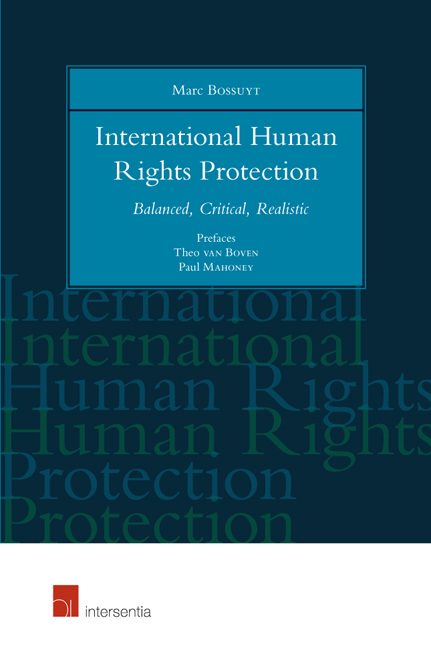Book contents
- Frontmatter
- Dedication
- Preface: A Lifetime of Fidelity and Participation
- Preface: A Penetrating and Salutary Analysis of the European System of Human Rights Protection
- Introduction
- Contents
- Epigraph
- PART ONE International Protection of Human Rights in General
- A The Normative Framework
- Chapter I The Concept of Human Rights
- Chapter II Social Rights: A Specific Category of Human Rights?
- Chapter III The Prohibition of Discrimination
- Chapter IV The Concept of Affirmative Action
- B The Institutional Framework
- PART TWO Specific Human Rights Protection
- Annex: At the Crossroads of Law and Politics
- Bibliographies
- About the Author
Chapter IV - The Concept of Affirmative Action
from A - The Normative Framework
Published online by Cambridge University Press: 25 September 2018
- Frontmatter
- Dedication
- Preface: A Lifetime of Fidelity and Participation
- Preface: A Penetrating and Salutary Analysis of the European System of Human Rights Protection
- Introduction
- Contents
- Epigraph
- PART ONE International Protection of Human Rights in General
- A The Normative Framework
- Chapter I The Concept of Human Rights
- Chapter II Social Rights: A Specific Category of Human Rights?
- Chapter III The Prohibition of Discrimination
- Chapter IV The Concept of Affirmative Action
- B The Institutional Framework
- PART TWO Specific Human Rights Protection
- Annex: At the Crossroads of Law and Politics
- Bibliographies
- About the Author
Summary
Before mentioning the justifications given for affirmative action and analysing the different forms of it, it is useful to make a survey of the international provisions dealing with affirmative action and of case law concerning that concept. The crucial question is to know whether affirmative action is an exception to the prohibition of discrimination or is limited by that prohibition. As far as terminology is concerned, it is important to ban the expression “positive discrimination”. Once it is admitted that in the international law of human rights the term “discrimination” is reserved for a difference of treatment that cannot be justified, the expression “positive discrimination” is a contradictio in terminis: if the difference is discrimination, it cannot be positive and, if it is justified, it cannot be discrimination. That is why expressions such as “affirmative action” (in US law) or “positive action” should be used. In UN human rights treaties the expression “special measures” is frequently used.
A. INTERNATIONAL PROVISIONS AND CASE LAW CONCERNING AFFIRMATIVE ACTION
A brief survey of international provisions concerning affirmative action, will be followed by one of the jurisprudence concerning that concept, mainly in the United States and in the European Union.
INTERNATIONAL PROVISIONS DEALING WITH AFFIRMATIVE ACTION
Among the most important international provisions dealing with “affirmative action”, the following may be mentioned:
– Article 5 of the Convention (No. 111) concerning Discrimination in Respect of Employment and Occupation, adopted on 25 June 1958 by the International Labour Organization, which reads:
“1. Special measures of protection or assistance provided for in other conventions or recommendations adopted by the International Labour Conference shall not be deemed to be discrimination.
2. Any member may, after consultation with representative employers’ and workers’ organizations, where such exist, determine that other special measures designed to meet the particular requirements of persons who, for reasons such as sex, age, disablement, family responsibilities or social or cultural status, are generally recognized to require special protection or assistance, shall not be deemed to be discrimination” (emphasis added).
- Type
- Chapter
- Information
- International Human Rights ProtectionBalanced, Critical, Realistic, pp. 43 - 56Publisher: IntersentiaPrint publication year: 2016



